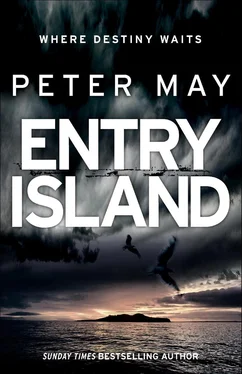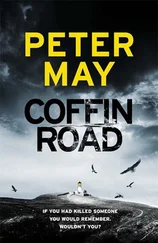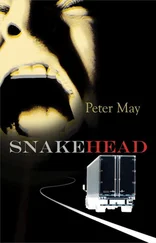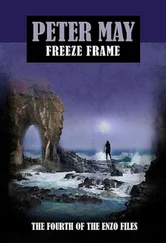Until I spoke the Gaelic to him, and his face lit up. ‘Man, I thought you were another of these bloody people come to jabber at me in English. There’s not one of them speaks God’s own language, and I can’t make myself understood at all.’ Then he glared at me suspiciously. ‘It’s a weird sort of Gaelic you speak, though.’
‘Not as weird as yours,’ I said.
‘Where are you from?’
‘Scotland.’
He roared and laughed then and slapped me on the back, and I think it is the first time I have heard human laughter in months. ‘Ach, you’re a Scotsman!’ he said. ‘Second-best to an Irishman, of course, but you’ll do. Did they send you?’
‘Aye,’ I said. ‘To find out what it is you want from them.’
His face clouded a little as his smile faded. ‘My brother Seamus left Cork on the Emily more than four months ago. He’d have been quarantined here, so there must be a record of him. They’re bloody meticulous about keeping their records. All I want is to confirm that he landed here safely and then passed on to Quebec City after his quarantine.’
‘Surely you could have found some way of asking them that?’ I said.
And then he shocked me by speaking English with a thick brogue and a foul mouth. ‘The fockers don’t speak the mother tongue, Scotsman. Just the fockin’ English.’
I was astonished. ‘But you speak it yourself.’ I raised my hands, at a loss to understand. ‘So where’s the problem?’
His eyes twinkled with mischief. ‘I’ve never given the English the pleasure of hearing me speak their bloody language yet. And I’m not about to start now.’
I laughed and shook my head. ‘But these people aren’t English, Michaél. They’re Canadian. And they only speak English or French.’
He guffawed again. A big, loud, infectious laugh. ‘In that case, it looks like I’m going to have to learn the fockin’ French, then.’
They gave me access to the arrival and departure records in the administration office this afternoon, and I sat at a table with a great big log that listed the arrival of every boat — where it was from, when it arrived, how many people were aboard, how many had died and were sick.
I looked for the Heather , sailing from Loch Glas in the Hebrides. But I couldn’t find any record of it. I asked the clerk if every boat that arrived stopped here at Grosse Île. He was a grey little man, with not much hair left, and sad green eyes. He said that every boat got stopped here, but because of pressure of numbers this year if the doctor found no disease aboard then the boat would be allowed to continue without quarantine.
And from that I took heart and hope that my mother and sisters had not faced disease aboard the Heather , and that they had passed on directly to Quebec City. I would find out when I got there.
I turned my attentions then to the passenger list for the Emily , whose arrival I found had been registered on July 2nd. The crossing had taken fifty-one days, with a hundred and fifty-seven passengers in steerage. Nine had died during the crossing and sixteen were sick on arrival. And there among the surviving passengers was one Seamus O’Connor. The grey clerk with the green eyes raised his head wearily when I troubled him for some further information. ‘Seamus O’Connor,’ I said. ‘Arrived on the Emily from Cork, Ireland, on July 2nd. Can you tell me when those passengers left for Quebec?’
He opened another huge ledger, and ran a bony finger with a dirty fingernail down columns of entries. ‘Here we are,’ he said. ‘The Emily was held in quarantine for just four days. Six of the sixteen that were put in hospital died.’ He ran his finger down another column, then looked up. ‘Seamus O’Connor was one of them. He’s buried in the mass graves.’
The mass graves are to be found in a flat, grassy area near the south-western tip of Grosse Île. The ground rises up on both sides, rocky and tree-covered. But through the trees beyond the graves, you can just see the sluggish swell of the river. Quebec City is somewhere there, not far upriver. So the dead were almost within sight of it.
Rows of crude white crosses pepper the grass that has grown freshly here over the recently disturbed earth. I found Michaél standing among the trees, sheltering from the drizzle and looking out over the crosses. He wore a blue woollen jacket and torn, baggy trousers held up by braces. The stitching in his boots was rotten and barely held them together. His hands were shoved deep in his pockets.
He nodded towards the graves. ‘That’s my countrymen buried out there,’ he said.
‘And mine.’
He looked at me. ‘Did you people have the famine, too?’
‘Yes.’
He turned away again. And I sensed anger in the way he clenched his jaw. ‘There’s not one of these poor bastards who would have chosen to leave. But if they’d stayed, they’d have starved to death.’ Anger flashed in his eyes now as he turned them on me. ‘With not a single landowner lifting a finger to help them.’ And then he blurted the question I knew he’d been afraid to ask. ‘So what did you learn about Seamus?’
I had been dreading the moment almost as much as he had. I was not at all sure how to tell someone that the person they love is dead. But I didn’t have to. He saw it in my face. And he turned away again quickly.
‘He’s out there, isn’t he?’ But I knew he didn’t expect an answer, and I saw big silent tears running down his cheeks to be lost among his whiskers. ‘Why couldn’t he have waited for me?’ He wiped away his tears with the back of his hands and I could see his embarrassment. ‘I pleaded for him to let me go with him. But, oh no. Too risky for his little brother. He wanted to go ahead on his own, establish himself here and make sure I had something worth coming to.’
He stood for a long time trying to contain himself. I had no idea what to say.
Finally he spoke again. ‘Looked out for me all our lives, did Seamus. Didn’t want to put me at risk. Mam starved to death, you see. And Da died of the cholera. So I was all he had left.’ He turned towards me. ‘I’d have starved to death too, if it hadn’t been for my brother. I never asked where the food came from that kept us alive, but he always came home with something.’
His face cracked open into a mirthless grin to disguise his grief.
‘Then he had this bright idea of coming over here. Great things he’d heard about the place. How you could have your own bit of land. Be a free man. Not in the pocket of some fockin’ landlord. Left me with an aunt and told me he’d send for me as soon as he’d found us something better. Only, I couldn’t wait, could I? Stole a bit of cash and bought my passage aboard the Highland Mary from Cork.’ His voice choked off, and he fought back his emotions again before gathering himself once more. ‘And now...’ He turned to look at me and I saw the pain in his eyes. ‘Now I’ve no idea what to do with my life.’ There was a long pause. ‘But I’ll tell you one thing.’ And suddenly the fire was back. ‘I’m not hanging around in this fockin’ place.’
I was sitting at the table in our Lazaretto when Michaél came looking for me this morning. I have spent the last few days teaching Catrìona’s children to count in English, as well as giving them some basic vocabulary. The Gaelic’s not going to take them very far in this land of English and French.
The boy’s eight, I think, and the girl about six, but not like children that age I remember from Baile Mhanais. There’s no play in them. No sparkle. Hunger and loss have taken their heart. So they sit docile and do what I say, eager simply for the attention. Anxious to please in the hope of some comfort in return. Like pet animals.
Читать дальше












